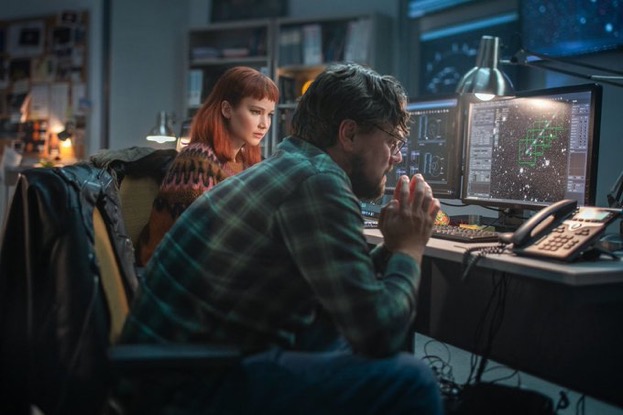Currently ranked seventh on Netflix’s Top Ten in the U.S. Today and 27th Annual Critics Choice nominee, “Don’t Look Up” uses satire, hilariously frightening writing and solid on-screen performances to break the expectations and assumptions of comedy.
The Netflix original, released on December 5th, 2021, follows astronomy professor Dr. Randall Mindy (Leonardo DiCaprio) and astronomy doctoral candidate Kate Dibiasky’s (Jennifer Lawrence) attempt to warn humankind about an extinction-level comet hurtling directly at Earth. After being dismissed and told to “hang tight” by the President of the United States (Meryl Streep), the pair embark on a media tour to inform the public of the incoming catastrophe and encourage governmental action.

What’s astonishing about the film — and frankly quite frustrating — is its depiction of a distracted world and people’s uncaring response to life-shattering news. As articulated by the movie’s description, the world’s reaction to the earth-destroying comet is an unenthusiastic, uninspired “meh.”
While the overarching tone of the movie is satirical, there is an overwhelming emotional uneasiness that builds throughout “Don’t Look Up” and eventually boils over by the film’s end. From the start, the media seems to undermine Kate and Dr. Mindy’s discovery based on increased publicity and public engagement. As an audience, we see a plethora of news outlets, social media platforms and celebrity arguments defending or denying the comet’s existence in an outwardly comedic and somewhat outlandish way.
As the film’s end approaches, this media-driven, pre-planned content shifts towards the authenticity of the Earth and its people. Images of a baby bathing, lovers embracing and forests burning replace derogatory memes against Kate and filtered celebrity Instagram stories. As the comet approaches Earth and the world faces its last seconds, “Don’t Look Up” becomes deeply emotional. The anxiety building throughout the film manifests into an altogether serious and melancholy explosion.
American filmmaker Adam McKay’s ambitions within this film seem more extensive and potent than expected out of his other comedies such as “Anchorman: The Legend of Ron Burgundy” (2004) and “Step Brothers” (2008). While still profoundly comedic and rich in satire, “Don’t Look Up” diverges from McKay’s previous works by implementing global issues that parallel our current, real-world social and political climate.
McKay originally intended “Don’t Look Up” to be a clear allegory for the climate crisis at hand — an evaluation of the nation’s inability to collectively solve a scientifically proven issue, as well as a climate activist’s call to help our Earth before it’s too late. This reason caused actors like DiCaprio to sign on to the project in the first place. However, the movie takes on new meanings within the current COVID-19 pandemic. From partisan division to misinformation, there are many instances throughout the film where satire becomes a frank look at reality, and COVID-19 seems like a natural replacement for the word ‘comet.’

This blurring of reality and parody within the film has ignited audience division. Some value the film’s attempt to call attention to the absurdity of the media and consider it an interesting look into the priorities of those in power. Others express their dislike for its equivocation of fact and fiction. As a piece of entertainment pointing its finger at how entertainment industries hinder essential human issues, the movie’s introspective value makes one genuinely assess the voices that hold influence and affect change.
Aesthetically, “Don’t Look Up” has the traits of a box-office smash hit: an all-star cast, dynamic and unexpected storylines and captivating cinematography. With actors such as Leonardo DiCaprio, Jennifer Lawrence, Meryl Streep, Timothée Chalamet, Jonah Hill, Tyler Perry and Cate Blanchett anchoring the film, the character execution and comedic expression is nothing short of charming. More than that, the dramatic pauses for comedic effect, tight shots of facial expressions and overall absurdity all read like a demented episode of NBC’s “The Office” that is both entertaining to observe as an audience member and utterly terrifying to imagine living through.
The movie’s pacing is intentionally slow and anxiety-inducing in some moments, yet driven and quick in others. The plot propels audiences further within the discussions of media mishaps, using memes, remixes and light-hearted journalism as a way to dilute messages of enormity within the trivial. Moreover, hyperbolic images such as non-comet believers shooting at the sky and the irony of the President asking her cabinet to “read the room” as she fails to address the problem at hand illustrates the absurdity of ignoring an issue so significant and impactful — another obvious call towards climate activism and the ignorance of those in power.

Most effectively implemented, however, is the film’s use of juxtaposition. Although present from start to end of the film, so much of “Don’t Look Up” is driven by Dr. Mindy’s and Kate’s seriousness towards the planet’s destruction and the light-hearted, unbothered, irritatingly whimsical and out-of-touch reactions of those with the power to do something about it. For instance, Kate is made fun of, ‘memed’ and categorized as mentally ill for speaking passionately and in an uninhibited manner about the planet’s doom. At the same time, the public praises Dr. Mindy for being an eloquent “TV personality” that boosts entertainment optics. The contrast between severe and impactful issues and inconsequential content is often startling.
In its totality, “Don’t Look Up” is a rib-tickling and deeply unsettling call to action. Although some speculate that the film’s message is a little “too close to home,” audience uneasiness surrounding the film’s likeness to real life seems intentional and purposeful. Despite polarizing opinions on the movie and its attempt to demonstrate activism from satire, so much of the film is rooted in assessment and evaluation, specifically those who hold financial, governmental and informational power.
While “Don’t Look Up” prompts its characters to choose to either avert or focus their eyes on the impending fate of humankind, watchers of the film won’t want to look away.
Clairesse Schweig is an Entertainment Intern for the winter 2022 quarter. They can be reached at cschweig@uci.edu.





